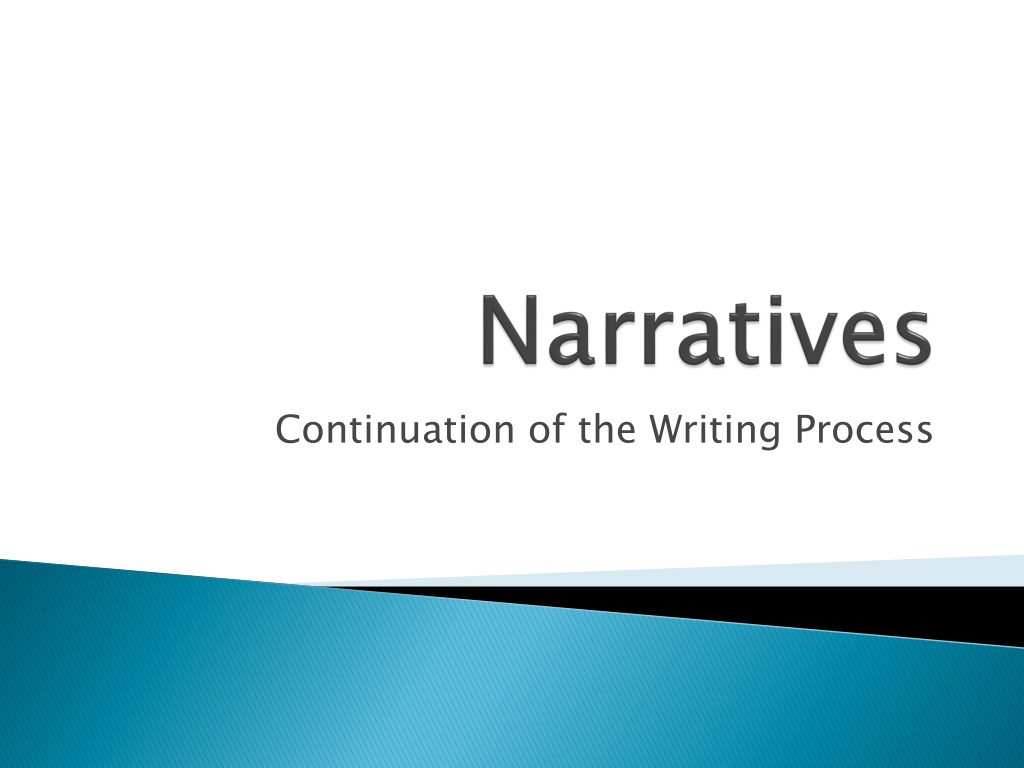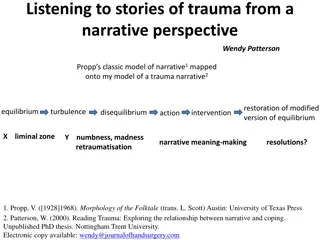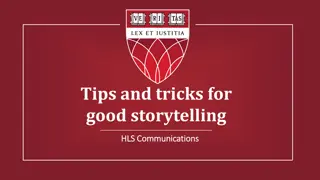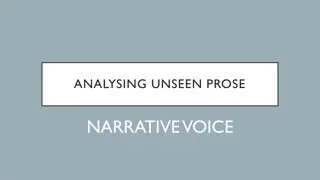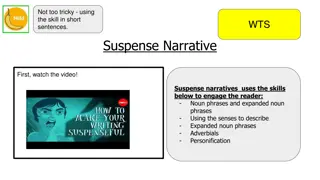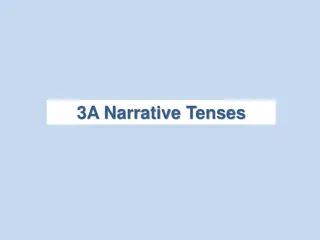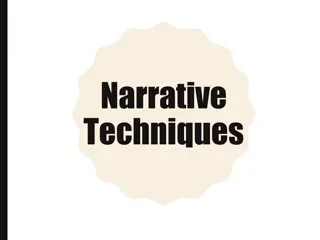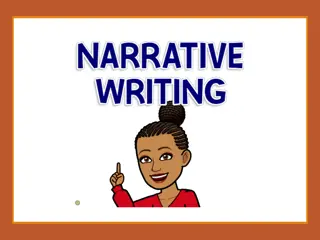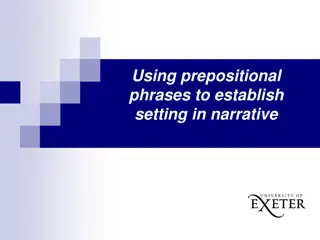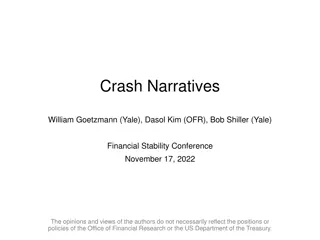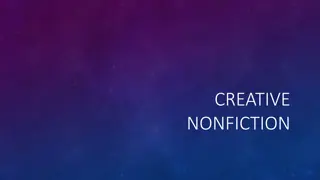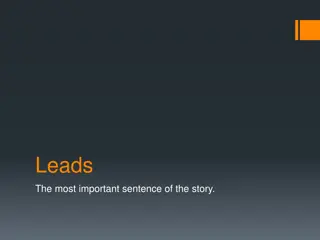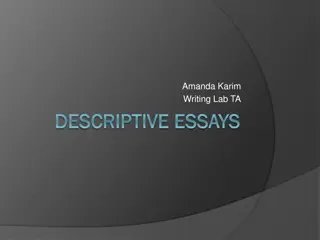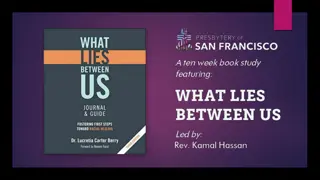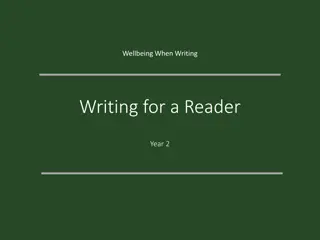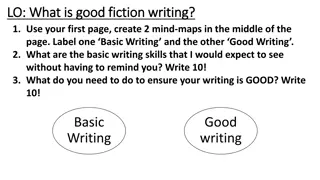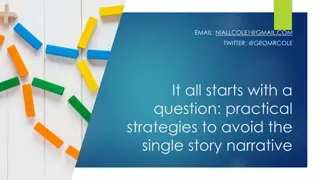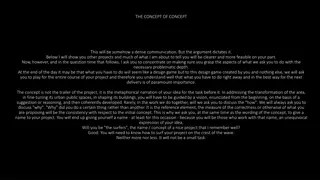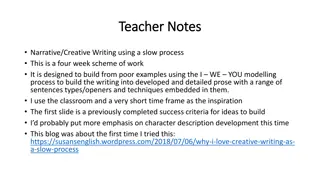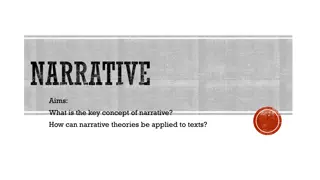Enhancing Narratives: Techniques to Engage Readers
Develop captivating narratives by leveraging effective techniques such as engaging narrator characters, utilizing physical characteristics, and focusing on character actions. Dive into the world of storytelling with techniques that bring depth and individuality to your characters, capturing readers' attention through immersive storytelling elements.
Download Presentation

Please find below an Image/Link to download the presentation.
The content on the website is provided AS IS for your information and personal use only. It may not be sold, licensed, or shared on other websites without obtaining consent from the author. Download presentation by click this link. If you encounter any issues during the download, it is possible that the publisher has removed the file from their server.
E N D
Presentation Transcript
Narratives experiences or events using technique, structured Narratives develop experiences or events using effective technique, well structured event sequences develop real real or or imagined effective details, and well imagined well- -chosen event sequences. . chosen details, and well- -
Engage your narrator character Ways to do this: 1. minimal) 2. character) 3. level) Engage your reader/audience your narrator (this should be your character) ) Ways to do this: 1. Use physical descriptions minimal) 2. Focus more on actions character) 3. Instilling more individuality and depth level) your reader/audience introduce (this should be your introduce Use physical descriptions (keep this to a (keep this to a Focus more on actions (this says a lot about the (this says a lot about the Instilling more individuality and depth (mastery (mastery
Using Physical Characteristics Ex: My name is Eugene years old. I feel like my hands are too big for my body; my mom says that I will grow one day, and I will be tall. When that happens, my body will be proportionate to my hands. I always look at her underneath my mousy brown hair when she says that, and I roll my brown eyes at her because she just doesn t understand what it s like. I mean, I feel like a mutant some days! All of the other kids at school have petite hands while mine are large enough to cover theirs entirely. I hate being different. Using Physical Characteristics Ex: My name is Eugene Spitnaz years old. I feel like my hands are too big for my body; my mom says that I will grow one day, and I will be tall. When that happens, my body will be proportionate to my hands. I always look at her underneath my mousy brown hair when she says that, and I roll my brown eyes at her because she just doesn t understand what it s like. I mean, I feel like a mutant some days! All of the other kids at school have petite hands while mine are large enough to cover theirs entirely. I hate being different. Spitnaz, and I am thirteen , and I am thirteen
Focusing More on Actions Ex something very peculiar. Along Mr. Pickle s fence, I happened to notice that some of his white paint was missing. I touched the vacant spot, and I noticed how rough the wood was under my fingertips. Something wasn t right, I decided. I right now and ask him what happened to his fence Just as that thought passed through my mind, a cold chill ran down my spine as the wind blew. I felt as if someone was watching me. Focusing More on Actions Ex: I was walking home today when I noticed something very peculiar. Along Mr. Pickle s fence, I happened to notice that some of his white paint was missing. I touched the vacant spot, and I noticed how rough the wood was under my fingertips. Something wasn t right, I decided. I needed right now and ask him what happened to his fence! ! Just as that thought passed through my mind, a cold chill ran down my spine as the wind blew. I felt as if someone was watching me. : I was walking home today when I noticed needed to go find Mr. Pickle to go find Mr. Pickle
Instilling more Individuality and Depth Ex Someone from a poem she believed in. She understood it to mean that if you took something to heart, really brought it inside those red velvet folds, then it would always be there for you. No matter what happened, it would be there waiting. She said this could mean a person, a place, a dream. A mission. Anything sacred. She told me that it is all connected in those secret folds. Always. It is all part of the same and will always be there, carrying the same beat as your heart. I am fifty Instilling more Individuality and Depth Ex: : There Someone once told me that. She said it came from a poem she believed in. She understood it to mean that if you took something to heart, really brought it inside those red velvet folds, then it would always be there for you. No matter what happened, it would be there waiting. She said this could mean a person, a place, a dream. A mission. Anything sacred. She told me that it is all connected in those secret folds. Always. It is all part of the same and will always be there, carrying the same beat as your heart. I am fifty- -two years old and I believe There is no end of things in the once told me that. She said it came is no end of things in the heart. heart. two years old and I believe it it
When reading story, what are some things that bother you as a reader? Other ways to keep your reader interested Vary your sentence ________________. Too many short sentences Too many long sentences This creates a _______________ writing style! Your sentences should ____________ smoothly together! The goal is to (has to do with your reader) When reading story, what are some things that bother you as a reader? Other ways to keep your reader interested Vary your sentence ________________. Too many short sentences Too many long sentences This creates a _______________ writing style! Your sentences should ____________ smoothly together! The goal is to (has to do with your reader)
Take out your journal that we wrote on today, and exchange it with a partner. Partner the margin. If they didn t vary their sentence lengths enough, let them know if they re too choppy or repetitive. If they used the same sentence type over and over, let them know they need more complex or compound sentences. Lastly, did the story hold your attention? Were you interested? If not, tell them what they can do to make it more interesting (in a respectful way). Take out your journal that we wrote on today, and exchange it with a partner. Partner: Read the journal, and leave comments in the margin. If they didn t vary their sentence lengths enough, let them know if they re too choppy or repetitive. If they used the same sentence type over and over, let them know they need more complex or compound sentences. Lastly, did the story hold your attention? Were you interested? If not, tell them what they can do to make it more interesting (in a respectful way). : Read the journal, and leave comments in
Use pacing, Ex: I just couldn t do it. I could not let those words escape just yet. Say it, John said. I can t, I responded. Tears were beginning to cloud my vision as I stared down at the wounded dog that I once knew as my pet. You can say goodbye. Do it while he s still breathing, he ordered. I sank to my knees. The coolness of the pavement made me shiver instead of offering me warmth and comfort, which reminded me of the truth: Buddy was dying. Use relevant descriptive pacing, & description Ex: I just couldn t do it. I could not let those words escape just yet. Say it, John said. I can t, I responded. Tears were beginning to cloud my vision as I stared down at the wounded dog that I once knew as my pet. You can say goodbye. Do it while he s still breathing, he ordered. I sank to my knees. The coolness of the pavement made me shiver instead of offering me warmth and comfort, which reminded me of the truth: Buddy was dying. relevant descriptive details & description details use dialogue, use dialogue,
This is conversation people as a feature of a book, play, or Rules: 1. Dialogue is put in quotations 2. If it introduces comma who is speaking Ex: Come to the park, , John pleaded. . Other methods: John exclaimed, , Come to the park with me! ! No! ! I shook my head at him to add emphasis. (you do not always have to state who has spoken) This is conversation between two or more people as a feature of a book, play, or movie. Rules: quotations ( ) introduces a sentence, you normally put a comma at the end and the period between two or more movie. period after you say Other methods:
Use make the story unfold logically BAD EXAMPLE: I had to go to my grandma s. I got to eat potatoes. My grandma loves potatoes. Potatoes are brown; I wonder why they are not square sometimes. I m thinking about making a machine that makes them square. Anyway, I am on my way to my grandma s when we run into a clown. I wonder if he would like square potatoes DON T DO THIS!!!! FOCUS! This is not a NATURAL way for the story to unfold! Use well make the story unfold naturally logically (I already did this in previous ex s) BAD EXAMPLE: I had to go to my grandma s. I got to eat potatoes. My grandma loves potatoes. Potatoes are brown; I wonder why they are not square sometimes. I m thinking about making a machine that makes them square. Anyway, I am on my way to my grandma s when we run into a clown. I wonder if he would like square potatoes DON T DO THIS!!!! FOCUS! This is not a NATURAL way for the story to unfold! well- -structured event sequences structured event sequences naturally and (I already did this in previous ex s) and
Use a VARIETY of clauses one time frame or setting to another. WITH THE FLOW!!!) Ex: my mother and me. remember how happy my mother was. She and my father spent lots she was whenever he got home from work How do the transition words, phrases, and clauses affect the flow? Next time you peer review, see if your partner has any of these. If not, write add more transitions. FLOW MATTERS Use a VARIETY of transition words clauses to convey sequence and signal shifts from one time frame or setting to another. (IT HELPS WITH THE FLOW!!!) Ex: Ever since my mother and me. Before remember how happy my mother was. She and my father spent lots of time together she was whenever he got home from work How do the transition words, phrases, and clauses affect the flow? Next time you peer review, see if your partner has any of these. If not, write add more transitions. FLOW MATTERS transition words, , phrases to convey sequence and signal shifts from phrases, and , and (IT HELPS Ever since my father died during war Before the war started my father died during war, it s always been the war started, I can , it s always been , I can of time together, and I remember how elated , and I remember how elated
Use precise words and phrases, relevant descriptive details, and sensory language to CAPTURE the action and convey experiences and events Ex: I felt as if someone was watching me My mouth became dry feel my pulse speed up and it caused tried to swallow of running, gulp of air, His sidewalk appeared normal as I walked, but what caught my eye was the sight of his flowers. They were always full of life and springy, but now the beautiful, yellow flowers looked as if they had been stomped by someone else. Use precise words and phrases, relevant descriptive details, and sensory language to CAPTURE the action and convey experiences and events Ex: I felt as if someone was watching me My mouth became dry as anxiety set in, and I could feel my pulse speed up. The air was and it caused the hair to stand up on my arms tried to swallow, but my of running, I straightened my back gulp of air, and His sidewalk appeared normal as I walked, but what caught my eye was the sight of his flowers. They were always full of life and springy, but now the beautiful, yellow flowers looked as if they had been stomped by someone else. as anxiety set in, and I could . The air was slightly chilly the hair to stand up on my arms. I , but my throat was too dry I straightened my back, took in a and walked slightly chilly, , . I throat was too dry. Instead , took in a large walked towards Mr. Pickle s house. . Instead large towards Mr. Pickle s house.
Create a SMOOTH progression of experiences or events. Ex. 1: The plane was crashing. I jumped out and found myself on an island. I was scared, but I went to make shelter anyway. I heard weird sounds Ex. 2: My heart was racing as I held onto my seat, trying to brace myself for impact as the plane plummeted into the murky waters. I lost grip on my seat and went flying toward the front. I hated myself for being the only one who did not bring my parachute with me. Hot tears began to well up in my eyes as the water began seeping into the abandoned plane. What have I done? Create a SMOOTH progression of experiences or events. Ex. 1: The plane was crashing. I jumped out and found myself on an island. I was scared, but I went to make shelter anyway. I heard weird sounds Ex. 2: My heart was racing as I held onto my seat, trying to brace myself for impact as the plane plummeted into the murky waters. I lost grip on my seat and went flying toward the front. I hated myself for being the only one who did not bring my parachute with me. Hot tears began to well up in my eyes as the water began seeping into the abandoned plane. What have I done?
Provide a conclusion that follows from and reflects on the narrated experiences or events BAD EXAMPLE: And they lived happily ever after! Better: (back to mutant anymore. At last, I grew to where I was over six feet tall, and my basketball coach treated me like I was a real player. None of the others ever called me a shrimp anymore either because I could touch the rim. I couldn t wait to be a freshman now because I might actually get to play varsity, and I can t wait! See you at the game! Provide a conclusion that follows from and reflects on the narrated experiences or events BAD EXAMPLE: And they lived happily ever after! - -_ _- - Better: (back to Spitnaz mutant anymore. At last, I grew to where I was over six feet tall, and my basketball coach treated me like I was a real player. None of the others ever called me a shrimp anymore either because I could touch the rim. I couldn t wait to be a freshman now because I might actually get to play varsity, and I can t wait! See you at the game! Spitnaz) Finally, I didn t feel like a ) Finally, I didn t feel like a
Prompt: Write a narrative in which you are the red duck. Use details from the story to explain to Mrs. how you came to be on the beach where she found you. Write from a first using dialogue, description, and chronology to describe your adventures. Prompt: Write a narrative in which you are the red duck. Use details from the story to explain to Mrs. Majeska how you came to be on the beach where she found you. Write from a first- -person point of view, using dialogue, description, and chronology to describe your adventures. Prompt: Read the following narrative about Sarah; then, in an organized essay, write the story from the John s point of view using details from the story. Develop his character, the setting, and organize details. Prompt: Read the following narrative about Sarah; then, in an organized essay, write the story from the John s point of view using details from the story. Develop his character, the setting, and organize details. Majeska person point of view, What they could ask you to do Writing Assessment
Subject: What you re doing in this setting (real or imagined experience), who lives in the tree, etc.? PREWRITE FIRST THEN DRAFT Subject: What you re doing in this setting (real or imagined experience), who lives in the tree, etc.? PREWRITE FIRST THEN DRAFT
C Choose how to develop the narrator first Next, develop the setting Sequence of events MAKE IT A LOGICAL sequence Start thinking about how you want the story to end that will determine what happens in the middle. Include some dialogue! Next, start drafting in your journal! hoose how to develop the narrator first Next, develop the setting Sequence of events what s going on first? MAKE IT A LOGICAL sequence Start thinking about how you want the story to end that will determine what happens in the middle. Include some dialogue! Next, start drafting in your journal! what s going on first?
Switch your papers with a partner (your Journal #19). Read the narrative, and then answer the following questions on the peer sheet finish). This is meant to be HELPFUL feedback and to prepare us for the 3 writing process. When BOTH of you are finished answering the questions, give the sheet & the story back. Switch your papers with a partner (your Journal #19). Read the narrative, and then answer the following questions on the peer- -review sheet (it won t matter that they didn t finish). This is meant to be HELPFUL feedback and to prepare us for the 3rd writing process. When BOTH of you are finished answering the questions, give the sheet & the story back. Look over the comments! review (it won t matter that they didn t rdstage of the stage of the Look over the comments!
Prewriting = Done Drafting = Done Revising & Editing? Prewriting = Done Drafting = Done Revising & Editing?
Revision draft, decide what works and what doesn t, and you make Revision follows drafting and precedes editing. Drafting work moves back and forth between the two stages Ex: You write, you read what you write, and then you make changes. You write some more, read it, decide what does not sound good, and you change it. It s an ongoing process. Revision process in which you evaluate your draft, decide what works and what doesn t, and you make changes as necessary Revision follows drafting and precedes editing. Drafting and revising often form a loop as a work moves back and forth between the two stages. . Ex: You write, you read what you write, and then you make changes. You write some more, read it, decide what does not sound good, and you change it. It s an ongoing process. process in which you evaluate your changes as necessary. . and revising often form a loop as a
To make revisions: Read through your draft and fix any errors you see fragments, run Are your sentences and word choices effective? This is where modifiers come into play =) To make revisions: Read through your draft and fix any errors you see (this could be spelling, commas, fragments, run- -ons, etc.). Are your sentences and word choices effective? This is where modifiers come into play =) (this could be spelling, commas, ons, etc.).
A or limits a particular word in a sentence in order to add emphasis, explanation, or detail. They are USUALLY descriptive such as adjectives and adverbs. Modifier phrases also to describe adjectives and adverbs. A modifier or limits a particular word in a sentence in order to add emphasis, explanation, or detail. They are USUALLY descriptive words, such as adjectives and adverbs. Modifier phrases also exist and tend to describe adjectives and adverbs. modifier changes, clarifies, qualifies, changes, clarifies, qualifies, words, exist and tend
To illustrate the power of modifiers, consider the following decide which keeps your attention: Sarah was a sure fit for junior prom queen The blonde girl named Sarah, who was a foreign exchange student from England, quickly climbed the ladder of popularity during her junior year, smiling her way through cheerleading and an ASB presidency term she inched near the top and was a sure fit as junior prom queen. To illustrate the power of modifiers, consider the following sentences and decide which keeps your attention: Sarah was a sure fit for junior prom queen. . The blonde girl named Sarah, who was a foreign exchange student from England, quickly climbed the ladder of popularity during her junior year, smiling her way through cheerleading and an ASB presidency term she inched near the top and was a sure fit as junior prom queen. sentences and
A (adjective/adverb) that is in the wrong place; it is separated from the word it modifies/describes. *Because of the separation, sentences with this error often sound awkward, ridiculous, or confusing (but humorous) A misplaced modifier (adjective/adverb), , phrase that is in the wrong place; it is separated from the word it modifies/describes. *Because of the separation, sentences with this error often sound awkward, ridiculous, or confusing (but humorous) misplaced modifier is a is a word phrase, or word , or clause clause
1. On woman s VS woman s silver earring On her way to work, Elaine saw the woman s earring VS On her way to work, Elaine saw the woman s silver earring laying on the bench her way to work, Elaine saw the silver earring laying on the park bench On her way to work, Elaine saw the silver 1. laying on the park bench laying on the bench. . 2. They Pumpkin VS for They bought a car for my sister they call Pumpkin. . VS They bought a car they call Pumpkin for my sister. bought a car for my sister they call 2. They bought a car they call Pumpkin my sister.
To correct a misplaced modifier, move it as close as possible to the word you intend it to modify. Ex: We watched the rocket shoot into space our aunt and uncle and uncle are being shot into space. CORRECT the rocket shoot into space. < actually WITH your aunt and uncle watching the rocket To correct a misplaced modifier, move it as close as possible to the word you intend it to modify. Ex: We watched the rocket shoot into space with our aunt and uncle. < and uncle are being shot into space. CORRECT: : With our aunt and uncle the rocket shoot into space. <- - Oh, so you re actually WITH your aunt and uncle watching the rocket with . <- - Sounds like your aunt Sounds like your aunt With our aunt and uncle, we watched , we watched Oh, so you re
1. A young mother pushed the stroller in a pair of jeans. 2. I saw Saturn s rings using a telescope. 3. Columbus met the native people exhausted from the voyage. 4. In 1492, we watched a movie about Columbus landing in Haiti. A young mother pushed the stroller in a pair of jeans. 2. I saw Saturn s rings using a telescope. 3. Columbus met the native people exhausted from the voyage. 4. In 1492, we watched a movie about Columbus landing in Haiti. 1.
Put a line down the center of the paper Im giving you. Create your own sentence with a misplaced modifier, and then draw a picture to go with it on one side (MAKE SURE IT IS SCHOOL APPROPRIATE!!). The picture should be literally what the sentence sounds like. On the other side, FIX the modifier, and draw a correct picture. Example: I saw an elephant in my pajamas. Put a line down the center of the paper I m giving you. Create your own sentence with a misplaced modifier, and then draw a picture to go with it on one side (MAKE SURE IT IS SCHOOL APPROPRIATE!!). The picture should be literally what the sentence sounds like. On the other side, FIX the modifier, and draw a correct picture. Example: I saw an elephant in my pajamas.
Example: I saw an elephant in my pajamas outside. Example: I saw an elephant in my pajamas outside. Correct: I was in my pajamas when I saw an elephant outside. Correct: I was in my pajamas when I saw an elephant outside.
Directions: Add modifiers to the following sentences to make them LIVELY. Directions: Add modifiers to the following sentences to make them LIVELY. 1. Jay has a dog. 2. The dog loves playing fetch. 3. Sheila plays music. 4. Her favorite instrument is a violin. Jay has a dog. The dog loves playing fetch. Sheila plays music. Her favorite instrument is a violin. 1. 2. 3. 4.
Watch out for Sentence Fragments Think about Dependent Clauses or Phrases independent clause, those are FRAGMENTS. Ex: Under a rock. Because he jumped. Watch out for Run If you have a compound sentence without a comma in front of your conjunction, that is considered a run Ex: She ran the race and she made it to the end even if she did not get first place. Peer Writers: PAY CLOSE ATTENTION & PROOFREAD! Watch out for Sentence Fragments Think about Dependent Clauses or Phrases Without an independent clause, those are FRAGMENTS. Ex: Under a rock. Because he jumped. Watch out for Run- -on Sentences If you have a compound sentence without a comma in front of your conjunction, that is considered a run- -on. Ex: She ran the race and she made it to the end even if she did not get first place. Peer- -Reviewers: CATCH THE MISTAKES! Writers: PAY CLOSE ATTENTION & PROOFREAD! Without an on Sentences on. Reviewers: CATCH THE MISTAKES!
Current problem with most narratives I have read Current problem with most narratives I have read What do we do to tell our paragraphs apart from one another? REVIEW! What do we do to tell our paragraphs apart from one another? REVIEW!
Note: in a narrative, the paragraphs are usually arranged in chronological order (in the order that the events happened Note: in a narrative, the paragraphs are usually arranged in chronological order (in the order that the events happened). ). One way to remember when to indent and begin a new paragraph is when ( (P P) the place changes, ( (A A) the action time/topic changes = (P (P- -A A- -T T- -S) S) ) the place ) the ) the action changes, ( (T T) the time/topic changes, and ( (S S) the speaker ) the speaker
T The shift in time, location, mood, day, date, direction, or space, writers alert their readers with I was walking in the field when I noticed something very strange by the barn. I wanted to check it out. It was probably nothing, but you never know anymore, so I began to walk faster. Once I made it to the barn, I noticed the difference now. The door had been left opened or maybe, someone else opened it. he setting shift in time, location, mood, day, date, direction, or space, writers alert their readers with an indent. I was walking in the field when I noticed something very strange by the barn. I wanted to check it out. It was probably nothing, but you never know anymore, so I began to walk faster. Once I made it to the barn, I noticed the difference now. The door had been left opened or maybe, someone else opened it. setting (PLACE) changes (PLACE) changes- -When When there is a there is a an indent.
T The action changes character is doing something, but they then transition and start doing something else, you need to start a new paragraph to avoid confusing your reader. Just as that thought passed through my mind, a cold chill ran down my spine as the wind blew. I felt as if someone was watching me. I climbed to the top of the porch and looked around to see if anything else was out of place. he action changes when the main character is doing something, but they then transition and start doing something else, you need to start a new paragraph to avoid confusing your reader. Just as that thought passed through my mind, a cold chill ran down my spine as the wind blew. I felt as if someone was watching me. I climbed to the top of the porch and looked around to see if anything else was out of place. when the main
The time in chronological order, time will change as you go on, and as it changes, you need a new paragraph First, I started cracking open the eggs and dumping them into a mixing bowl. I poured in a half cup a milk and added cinnamon. Then, I grabbed a spoon to start mixing them all together By ten o clock, I had breakfast all ready before my family was even awake. The time changes in chronological order, time will change as you go on, and as it changes, you need a new paragraph. . First, I started cracking open the eggs and dumping them into a mixing bowl. I poured in a half cup a milk and added cinnamon. Then, I grabbed a spoon to start mixing them all together By ten o clock, I had breakfast all ready before my family was even awake. changes when talking about things when talking about things
T The topic changes information, details, or ideas shift to another aspect paragraph. I started telling him the story of how my life changed, and I knew from the beginning that it would be hard for him to take in. So, I started talking, and he listened intently. It all started when my third grade teacher introduced me to an interesting book series... he topic changes- -When information, details, or ideas shift to another aspect of the topic, it's time for a paragraph. I started telling him the story of how my life changed, and I knew from the beginning that it would be hard for him to take in. So, I started talking, and he listened intently. It all started when my third grade teacher introduced me to an interesting book series... When the facts, the facts, of the topic, it's time for a new new
T The speaker changes person is talking, and to avoid confusing your reader, you must start a new paragraph and indent each time someone new is talking. I hope the police can investigate this whole thing I just hope that wherever he is, and no matter what has happened I just hope that he is safe, I replied. Me too. he speaker changes to show that a new person is talking, and to avoid confusing your reader, you must start a new paragraph and indent each time someone new is talking. I hope the police can investigate this whole thing. I just hope that wherever he is, and no matter what has happened I just hope that he is safe, I replied. Me too. to show that a new . Laura stared out the Laura stared out the window. window.
I thought it was a morning like any other morning until my mother woke me up in a hurry. We are going on a road trip! she said happily. I whined loudly and pulled the covers over my head. This was not happening, I thought to myself. After about five minutes, the light switched on. RISE AND SHINE! my mother yelled, pulling the covers off of my entire bed. (CHANGE IN TIME) (CHANGE IN TIME)
James found himself running down the stairs, homework in hand, attempting to catch the bus. With every step he took, the sense of urgency became greater because he knew the bus wouldn t wait forever. The sounds of his footsteps rang through the air, bouncing off the walls of the stairwell. This wasn t the best of mornings; he had overslept majorly, and he couldn t get a certain thought out of his mind he could remember hearing his mother mention something about a new job last night to his father (change in topic) (change in topic)
I sat in my room, my knees to my chest. I was staring out the window once again, trying to be patient. I knew it would happen again, and this time, I was going to take action I would not be silent again. All of a sudden, I stood up. I heard the sounds, and I knew the robbers were back. They were next door once again attempting to break into my neighbor s house, but this time, I was going to get the police involved. (change in action) I sat in my room, my knees to my chest. I was staring out the window once again, trying to be patient. I knew it would happen again, and this time, I was going to take action I would not be silent again. All of a sudden, I stood up. I heard the sounds, and I knew the robbers were back. They were next door once again attempting to break into my neighbor s house, but this time, I was going to get the police involved. (change in action)
I am giving you a short narrative that I started. Front: I ve already made separate paragraphs; you tell me what the change is each time a new paragraph starts. Back: I want YOU to tell me where a new paragraph needs to start (it s one big block). Finished? Continue your journal... I am giving you a short narrative that I started. Front: I ve already made separate paragraphs; you tell me what the change is each time a new paragraph starts. Back: I want YOU to tell me where a new paragraph needs to start (it s one big block). Finished? Continue your journal...
Imagine reading a page without paragraph breaks. Paragraphs create order recognize the boundaries where one point ends order and logic logic by helping your reader one point ends and another begins another begins.
